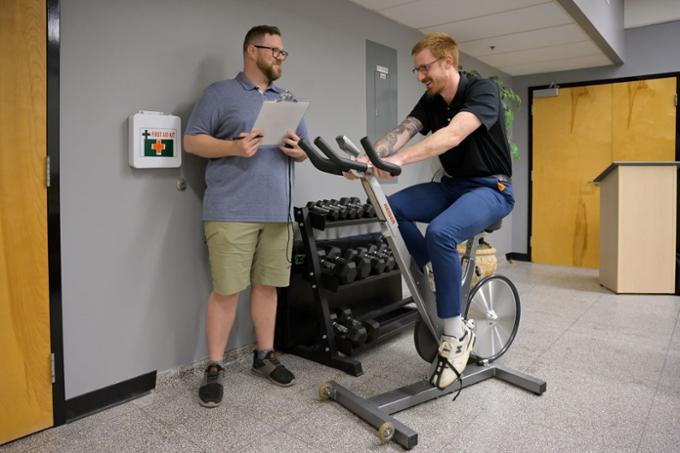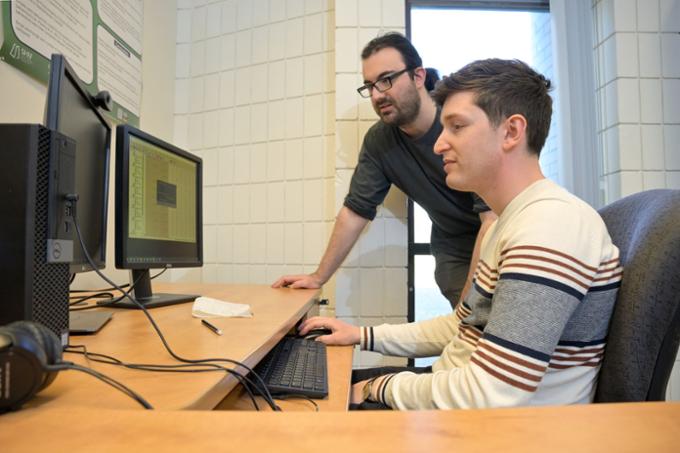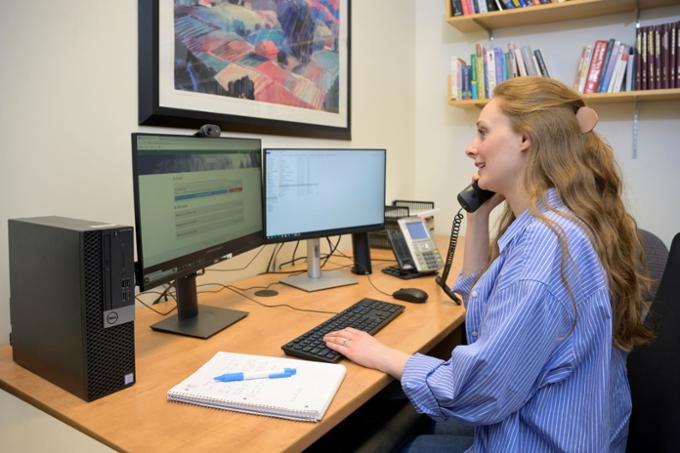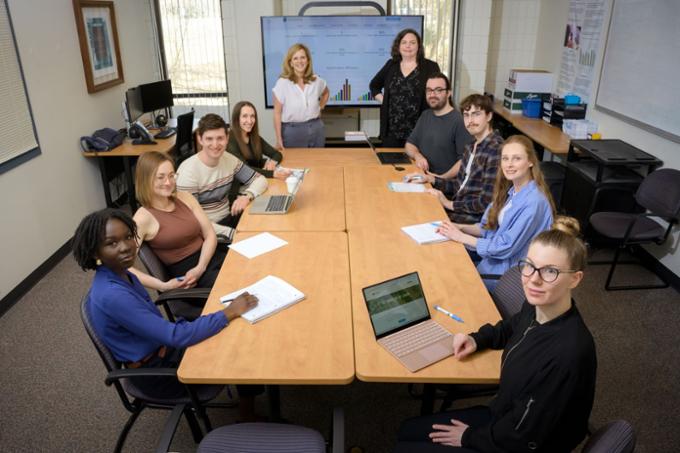
Clinical Psychology Graduate Program
Mission
The mission of the Clinical Psychology Program at the University of Regina it to train our students in the scientist-practitioner tradition so that they will be prepared to work as either a researcher, teacher or practitioner or all of these within a variety of settings (academic, clinical, or research setting).
Philosophy/Principles
In keeping with the motto of the University of Regina as “One Who Serves” the philosophy of the clinical program in the Department of Psychology is characterized by a commitment to our responsibility to society and to our responsibility to the profession. In fulfilling these responsibilities, we endeavour to ensure that our students are not only knowledgeable and competent in both delivery of services and in the conduct of creative research, but that they also endorse an ethic of care. Underlying these skills and attitude acquisitions is the principle of integrity in relationships, which, in turn, is characterized, by respect for the dignity, and welfare of others.
The Clinical Psychology program at the University of Regina aims to prepares future psychologists to work effectively with all individuals. We expect students and faculty to treat all persons with respect and fairness, and we strive to foster appreciation, awareness, and knowledge of demographic and cultural diversity. As a program, we affirm students' rights to maintain their personal beliefs, faiths and customs. For students to cultivate the competencies necessary for practice as a professional practice psychologist, we also require students to develop both the knowledge and skills to work with individuals across the full spectrum of demographic and cultural variability.
The University of Regina Clinical Program is committed to diversity, equity and inclusion and we encourage applications from diverse candidates.
Accreditation
The Ph.D. program in Clinical Psychology has been fully accredited by the Canadian Psychological Association (CPA) since the 2003-2004 academic year. During our October 2021 CPA site-visit, our program was re-accredited for seven years; until 2027-2028. Information regarding CPA accreditation can be obtained by contacting the CPA Accreditation Office at:
Accreditation Office
Canadian Psychological Association
141 Laurier Avenue West, Suite 702
Ottawa, ON K1P 5J3
CPA website: www.cpa.ca
Clinical Degree Programs


The degree programs in Clinical Psychology offered in the Department are based on a scientist-practitioner model of training and emphasise clinical, research, and professional skill development.
The M.Sc. program in Clinical Psychology is intended to provide students with a solid grasp of basic academic and practical skills. The Ph.D. program in Clinical Psychology builds upon the M.Sc. program and provides an opportunity for advanced research, study, and clinical skills acquisition. In line with the current emphasis of many programs and jurisdictions in North America with respect to academic training and credentialing in Psychology, students pursuing graduate education and training in Clinical Psychology are strongly encouraged to do so at the doctoral level. As such, all students completing the M.Sc. are expected to apply to the Ph.D. program. Students who are enrolled in our clinical program are expected to maintain full-time student status.
The Department's doctoral program in Clinical Psychology is fully accredited by the Canadian Psychological Association. The next accreditation site visit is planned for the 2027-2028 academic year.
Clinical Program Resources
Clinical Training
Students in the graduate program in Clinical Psychology complete a minimum of 900 hours of supervised practical experience consisting of a 600 hour four month internship in Clinical Psychology (Psyc 876) and a minimum of two additional 150 hour Practica in Clinical Psychology (Psyc 870-875) prior to the full-year Pre-doctoral Residency in Clinical Psychology (Psyc 880AB). No more than 600 hours of the required supervised clinical experience can be undertaken for academic credit by students enrolled in the M.Sc. program in Clinical Psychology. For the full-year pre-doctoral residency, students are expected to apply to CPA accredited sites or equivalent and to go through the Association of Psychology Postdoctoral and Internship Centers (APPIC) matching process (www.appic.org).Students will receive at least 300 hours of direct contact with clients prior to the pre-doctoral residency and at least 150 hours of supervision.
Our Graduates
Graduates from our program have been highly successful in obtaining employment in clinical settings (e.g., hospitals, mental health clinics) and research settings (e.g., universities). All of our doctoral clinical program graduates have been successful in becoming registered, licensed or certified (or, in the case of very recent graduates, are in the process of becoming registered, licensed or certified) as psychologists in the jurisdiction of their choice.

M.Sc. Program Details
All course work is taken in the first academic year. The second academic year is used to complete research and usually the four month internship. Students in this program will normally apply for admission to the Ph.D. program in Clinical Psychology in January of their second year in the program. At this time of application to the PhD, all required course work and the clinical internship should be complete and data collection for the MA well underway. The likelihood of being accepted into the PhD program decreases if students do not meet these timelines.
Course |
Credit Hours |
| PSYC 801 Research Design and Methodology in Psychology | 3 credit hours |
| PSYC 802 Applied Multivariate Statistics | 3 credit hours |
| PSYC 806 Ethics and Standards of Professional Practice | 3 credit hours |
| PSYC 832 Advanced Psychopathology | 3 credit hours |
| PSYC 850 Psychological Assessment I | 3 credit hours |
| PSYC 860 Psychological Interventions I | 3 credit hours |
| PSYC 876 Internship in Clinical Psychology | 1 credit hour |
| PSYC 900 Graduate Seminar | 2 credit hours |
| PSYC 901 Thesis Research | 16 credit hours |
| Total Credit Hours: 37 credit hours |
Ph.D. Program Details
Ph.D. courses are typically offered every 2nd year. In addition to the above, students must demonstrate competence in: (a) biological bases of behaviour (e.g., physiological, comparative, neuropsychology, psychopharmacology); (b) cognitive and affective bases of behaviour (e.g., learning, sensation, perception, cognition, motivation, emotion); and (c) social bases of behaviour (e.g., social, cultural, ethnic, and group processes, sex roles, theories relating to organisations and systems). This can be accomplished either by taking a graduate course in each of these areas (one of which could be used to fulfil the Ph.D. elective course requirement), or by completing all-inclusive qualifying examinations (for students who demonstrate significant prior experience in an area, qualified faculty will co-ordinate the relevant reading lists and exam). A combination of graduate courses and examinations may also be used to fulfil the requirements. Moreover, students can demonstrate competence (subject to approval by the clinical committee) in a maximum of one cognate area (i.e., biological, cognitive or social) if they have completed a minimum of two advanced undergraduate courses in any one of the three cognate areas. Courses in these cognate areas may be taken at any point during the student’s graduate training with departmental approval. In addition, students are encouraged to take courses in other areas such as program development/evaluation.
Comprehensive Examination
The Ph.D. Comprehensive Examination (Psyc 865-CL) covers broad aspects of clinical psychology, and consists of four parts:
- A case presentation (~2 hours in length for presentation and questions) in which students are required to summarize a case that they have assessed and treated during a previously completed practicum or internship. In the presentation, the student must cover and integrate theory, research, assessment, and intervention in relation to the clinical case.
- A written exam testing students on recent literature published in the Annals of Clinical Psychology
- An ethics oral examination (~1 hour in length) during which students are asked questions that are designed to assess their understanding of ethical and professional issues and their ability to resolve ethical dilemmas.
- A program evaluation proposal. The following students are exempt from this component: a) Students who successfully completed a graduate course in program evaluation; b) students who participated in the Canadian Evaluation Society Annual Case Competition; and c) students who completed substantial supervised work (as determined by the clinical committee) in the area of program evaluation including a written program evaluation report.
The comprehensive examination process is typically completed over a four-month time span and is used as a means of judging whether or not the student has a mature and substantial grasp of the discipline and the ability to integrate theory, research, and practice in the areas of psychopathology, assessment, treatment, and ethics.
This examination is scheduled after the student has completed all degree requirements, with the exception of the doctoral dissertation and pre-doctoral residency. It must be taken prior to applying for the pre-doctoral residency.
All parts must be passed in order to meet the comprehensive examination requirement. Unsuccessful candidates for the comprehensive examination may repeat each component of the examination once. A second failure will result in the student being discontinued from the Clinical Program.
Course |
Credit Hours |
| PSYC 800 History, Theory and System in Psychology (or equivalent, e.g., Psyc 824, 826) |
3 credit hours |
| PSYC 803 Psychometrics | 3 credit hours |
| PSYC 851 Psychological Assessment II | 3 credit hours |
| PSYC 861 Psychological Interventions II | 3 credit hours |
| One elective Psychology course | 3 credit hours |
| PSYC 865 Comprehensive Exams | 1 credit hour |
| PSYC 870 Practica in Clinical Psychology | 1 credit hour |
| PSYC 871 Practica in Clinical Psychology | 1 credit hour |
| PSYC 880AB Residency in Clinical Psychology | 3 credit hours |
| PSYC 900 Doctoral Seminar | 1 credit hour |
| PSYC 901 Thesis Research | 44 credit hours |
| Total Credit Hours: 66 credit hours |
Supervisors
Supervisors accepting graduate students for 2026 - 2027 will be shown as 'Yes'.
Supervisors not accepting graduate students for 2026 - 2027 will be shown as 'No'.
| Dr. Gordon Asmundson | Yes |
| Dr. Kaila Bruer | Yes |
| Dr. Nick Carleton | Yes |
| Dr. Natasha Gallant | Yes |
| Dr. Jennifer Gordon | Yes |
| Dr. Heather Hadjistavropoulos | Yes |
| Dr. Thomas Hadjistavropoulos | Yes |
| Dr. Lauren Hallion | Yes |
| Dr. Bianca Hatin | No |
| Dr. Lynn Loutzenhiser | No |
| Dr. Richard MacLennan | Yes |
| Dr. Chris Oriet | No |
| Dr. Tom Phenix | No |
| Dr. Katherine Robinson | Yes |
| Dr. Donald Sharpe | No |
| Dr. Sarah Sangster | Yes |
| Dr. Austen Smith | No |
| Dr. Laure Sykes Tottenham | Yes |
| Dr. Tamara Williamson | Yes |
| Dr. Kristi Wright | Yes |
| Dr. Susan Yamamoto | No |
| Dr. Sarah Zanette | No |
